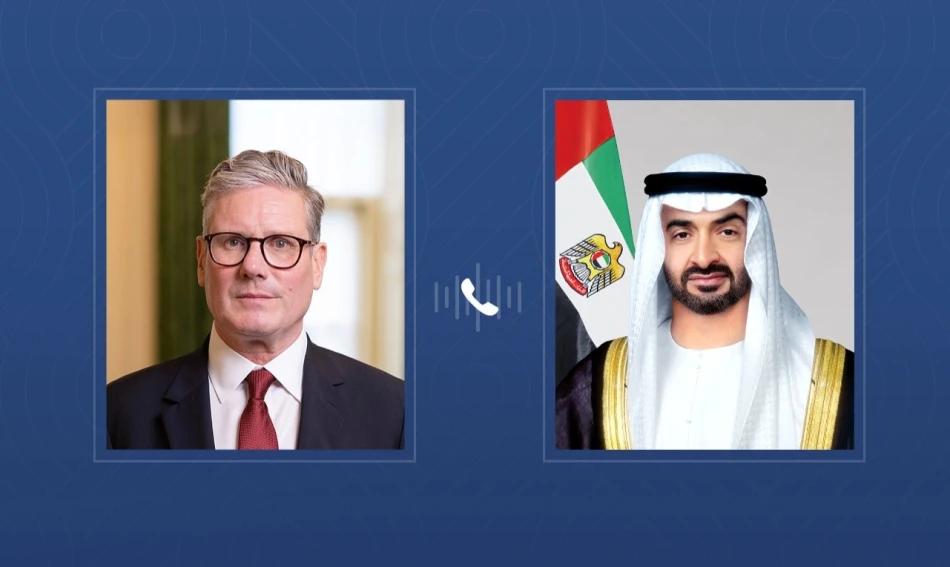
UAE President and UK PM Discuss Bilateral Ties and Regional Developments in Telephone Call
UAE and UK Leaders Align on Gaza Ceasefire and Palestinian Statehood Recognition
UAE President Sheikh Mohammed bin Zayed Al Nahyan and UK Prime Minister Keir Starmer reinforced their nations' commitment to Middle East stability during a phone call that emphasized urgent Gaza ceasefire efforts and Britain's intention to recognize Palestinian statehood. The discussion signals growing international momentum toward a two-state solution as humanitarian conditions in Gaza continue to deteriorate.
Diplomatic Push for Immediate Gaza Relief
The leaders prioritized establishing an immediate ceasefire in Gaza and ensuring unobstructed humanitarian aid flows to the territory's residents. Sheikh Mohammed bin Zayed emphasized the critical need for sufficient relief supplies to reach Gaza without barriers, addressing the severe humanitarian crisis affecting the population.
This coordinated approach reflects a broader international strategy where Gulf states leverage their regional influence while European nations provide diplomatic backing for sustainable peace initiatives.
British Recognition of Palestinian State Gains UAE Support
Sheikh Mohammed bin Zayed praised Prime Minister Starmer's statements regarding Britain's intention to recognize a Palestinian state, marking a significant diplomatic development. This UK position aligns with growing European momentum toward Palestinian recognition, following similar moves by Spain, Ireland, and Norway earlier this year.
The UAE's endorsement carries particular weight given its 2020 Abraham Accords normalization with Israel, demonstrating that Arab-Israeli diplomatic progress need not preclude Palestinian statehood aspirations.
Strategic Implications for Regional Diplomacy
The UAE's balanced approach—maintaining ties with Israel while supporting Palestinian statehood—positions Abu Dhabi as a crucial mediator in future peace negotiations. This diplomatic flexibility mirrors successful Gulf strategies in other regional conflicts, where economic incentives complement political dialogue.
Two-State Solution as Regional Stability Foundation
Both leaders emphasized that a "just, comprehensive, and lasting peace" based on the two-state solution remains the only viable path to regional stability. This framework has gained renewed international support following the October 7 attacks and subsequent Gaza conflict, with major powers recognizing that temporary ceasefires cannot address underlying territorial and sovereignty issues.
The timing of this UAE-UK alignment coincides with increased US diplomatic engagement and Saudi Arabia's conditional normalization offers with Israel, creating potential momentum for comprehensive regional agreements.
Broader UAE-UK Strategic Partnership
Beyond Middle East issues, the leaders discussed expanding bilateral cooperation across multiple sectors, building on historical ties between the nations. The UAE represents Britain's largest Middle East trade partner, with investments spanning renewable energy, financial services, and defense technology.
This economic foundation provides both countries with substantial leverage in regional diplomacy, as their combined influence extends across traditional and emerging power centers in the Middle East and globally.
Most Viewed News

 Sara Khaled
Sara Khaled






